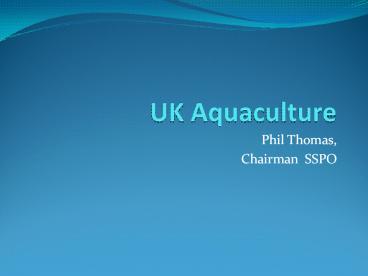UK Aquaculture - PowerPoint PPT Presentation
1 / 21
Title:
UK Aquaculture
Description:
Phil Thomas, ... The notion that salmon farming is not sustainable because of its fish-feed needs is incorrect. World Fish Meal Production Aquaculture Feed ... – PowerPoint PPT presentation
Number of Views:309
Avg rating:3.0/5.0
Title: UK Aquaculture
1
UK Aquaculture
- Phil Thomas,
- Chairman SSPO
2
Global Population is Increasing
World Total
Developing Countries
Developed Countries
Depending on assumptions about affluence, diet
composition and food waste these figures imply
an increase in total food production of 50-70
of current production consumption.
3
Projection of human energy and protein-food
consumption (after FAO)
Energy (kcal/day) Meat (g/d) Milk (g/d)
1964-66 2358 66 202
1997-99 2803 100 214
Estimated 2030 3050 124 245
4
What about fish?
- Total global consumption is increasing because of
population increase and increased consumption
per head. - But FAO says
- One-quarter of the world's fish stocks are
overexploited, depleted or recovering from
depletion. There is no possibility of increasing
fishing activity in some cases the stocks may
decline further. - About half of the stocks are fully exploited.
They are being fished at or close to their
maximum sustainable limit. There is no room for
further expansion of fishing activity. - Around one-quarter of fish stocks are
underexploited or partially exploited and could
perhaps produce more.
5
Trends for Fish?
Trends in Global Fish
- Aquaculture provides an increasing proportion of
fish supply this will continue to rise. - Global aquaculture production is circa 67
million tonnes. Most is produced in China /Asia.
Main species there are low value carp, tilapia
and other fresh water fish. - EU production is relatively small but EU is the
largest global importer of fish and seafood
products and is only 40 self sufficient in
supply. EU has a major structural deficit in fish
supply.
Country World Production ()
China 66.6
Asia - China 22.8
Europe 3.3
South America 2.7
North America 1.3
Africa 1.2
6
European
EU Aquaculture
tonnes
tonnes
7
UK Aquaculture Production
- Shellfish
- Pacific oysters
- Native oysters
- Scallops
- Queens
- Mussels (97 31.9m)
- Clams
- Cockles
- Finfish
- Salmon (90, 400m)
- Trout (9, 45m)
- Halibut
- Turbot
- Sea bass
- (Cod)
8
Mussels
9
Trout
10
Annual Scottish Farmed Salmon Production
Tonnes x 1000
Anticipated
The Crown Estate Islands Councils
Interim Arrangements
Town Country Planning Act
11
Marine Scotland Salmon Fisheries Regions
East North East Moray Firth North North West West
Coast Clyde Coast Solway Orkney Shetland Outer
Hebrides
12
(No Transcript)
13
Technology Development
After Hanlon
Plastic Pens
(After, Chopin, 2010)
14
Feed and Nutrition
- A conversion ratio of caught fish to farmed
salmon of 51 is often quoted. This figure is
incorrect and based on an incorrect set of
assumptions. - Modern salmon nutrition and aquaculture feed use
provides a conversion rate of 1.251. However,
about 25 of fish meal is derived from waste from
fish processing. - Inclusion rates of fish meal in salmon diets have
been reducing progressively as feed technology
develops. - The notion that salmon farming is not
sustainable because of its fish-feed needs is
incorrect.
15
World Fish Meal Production and Use in Aquaculture
World Fish Meal Production
Aquaculture Feed
16
IFFO Summary of Changing Use in Fishmeal Use
17
Alternatives to Fish Meal
(After Skretting, 2010)
18
Marine Scotland Salmon Fisheries Regions
East North East Moray Firth North North West West
Coast Clyde Coast Solway Orkney Shetland Outer
Hebrides
19
Distribution of Scottish Salmon Farms
West Salmon Farms East Salmon Farms
Shetland 107
Orkney 19
North West 42 North 2
West Coast 41 North East 0
Clyde Coast 15 Moray Firth 0
Outer Hebrides 45 East 0
Solway 0
Total sites
271 Total consented biomass 298, 113 tonnes
20
Why are farms distributed like this?
- History, Policy, and Planning
- Salmon Catch Distribution
- Historically salmon farming started in west coast
and island areas because of the water quality
and suitability of sites. - Government Planning Policy in 1997 to locate
farms to the west coast and islands. - Scottish Government Locational Guidelines based
on predicted nutrient enhancement, benthic impact
and natural heritage sensitivities direct
location.
Total Catch East Coast West Coast
1970 409,032 85 15
1985 272,552 84 16
1990 169,009 81 19
1995 180,143 85 15
2000 101,498 85 15
2008 101,519 83 17
21
Thats All Folks!































